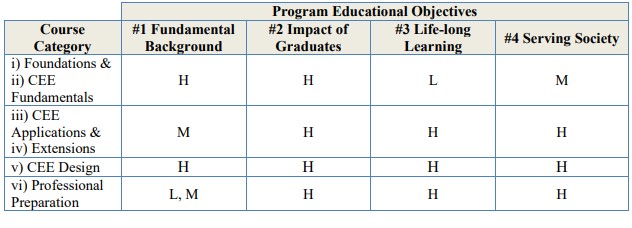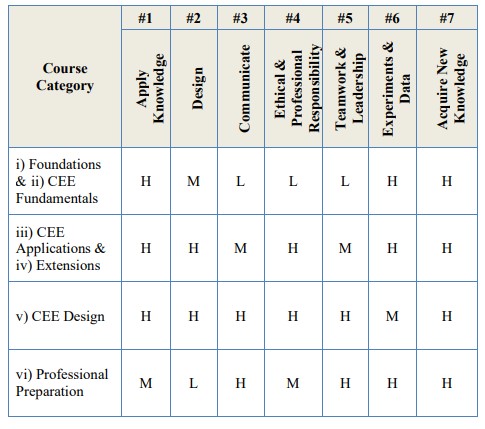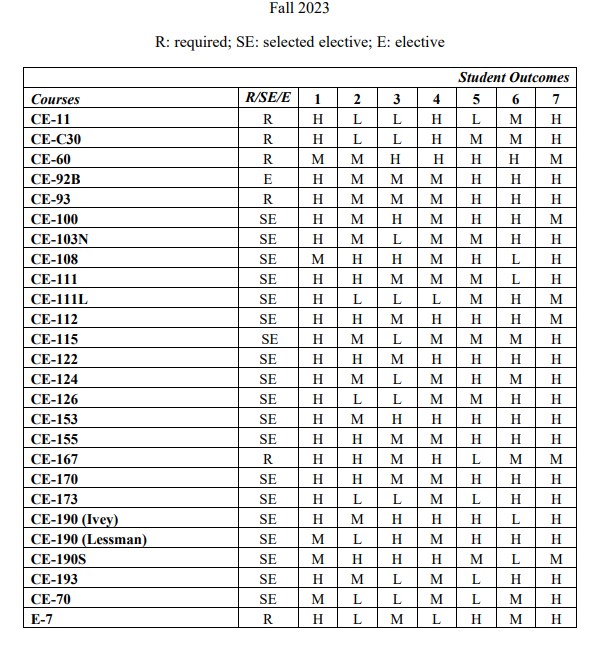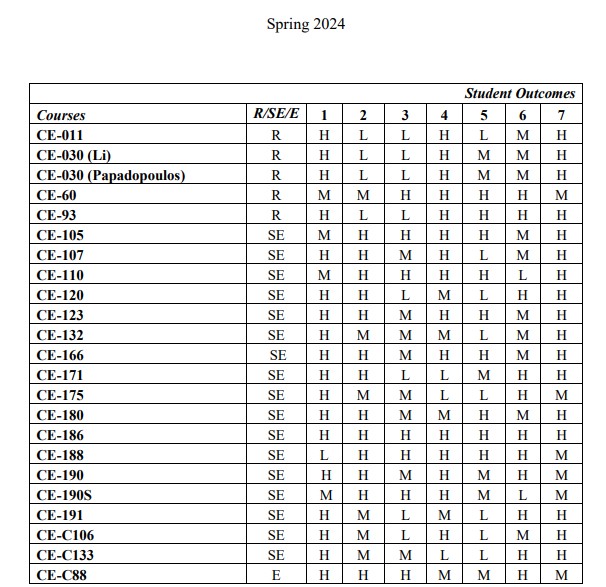Mission Statement
The Civil Engineering and Environmental Engineering undergraduate programs educate engineering leaders who will contribute to solving societal problems by improving the civil infrastructure, resource protection, natural hazard mitigation, and the efficient and sustainable functioning of engineered and natural systems in California, the United States, and the world. These objectives are achieved by:
- Educating students with fundamental mathematical, scientific, and engineering knowledge to have a significant and positive long-term impact on the field of civil and environmental engineering.
- Inspiring students and preparing them for successful professional careers, for further studies in high-quality graduate programs in engineering or other professional fields, and for a lifetime of learning.
- Emphasizing the importance of professional and personal ethics, business and management leadership, and service to society.
Student Outcomes
- An ability to identify, formulate, and solve complex engineering problems by applying principles of engineering, science, and mathematics.
- An ability to apply engineering design to produce solutions that meet specified needs with consideration of public health, safety, and welfare, as well as global, cultural, social, environmental, and economic factors.
- An ability to communicate effectively with a range of audiences.
- An ability to recognize ethical and professional responsibilities in engineering situations and make informed judgments, which must consider the impact of engineering solutions in global, economic, environmental, and societal contexts.
- An ability to function effectively on a team whose members together provide leadership, create a collaborative and inclusive environment, establish goals, plan tasks, and meet objectives.
- An ability to develop and conduct appropriate experimentation, analyze and interpret data, and use engineering judgment to draw conclusions.
- An ability to acquire and apply new knowledge as needed, using appropriate learning strategies.
| Student Outcomes | Short description of Student Outcomes | #1 Fundamental Background | #2 Impact of Graduates | #3 Life-long Learning | #4 Serve Society |
| 1 | Engineering, science and mathematics | High | High | High | High |
| 2 | Design in presence of constraints | High | High | High | |
| 3 | Communicate effectively | High | Medium | ||
| 4 | Professional and ethical responsibility | High | High | High | High |
| 5 | Teamwork and leadership | High | High | High | |
| 6 | Experiments and data | High | High | High | High |
| 7 | Acquire new knowledge | High | High | High | High |
Program Educational Objectives
The CEE department has agreed upon four Program Educational Objectives.
Graduates from our program will:
1. Use fundamental science and engineering principles relevant to a forward-looking vision of professional practice in civil and environmental engineering.
2. Use technical, management, and communication skills as a foundation for impactful careers in engineering.
3. Be inspired to be lifelong learners and foster continuous innovation to confront local, national, and global challenges.
4. Become leaders in their fields who adhere to the highest ethical standards and serve society.
How CEE Core Courses Support Student Outcomes
CEE faculty have provided a mapping of student outcomes to the curriculum and each course. The table lists associated support provided. The support is rated as: High (H), Moderate (M), or Low (L). Please note: this table is currently applicable for the Civil Engineering major only; the table for the Environmental Engineering major is forthcoming.




Census and Graduation Data
Civil Engineering Major Student Matriculation Headcounts
| Class | 2018 Fall | 2019 Fall | 2020 Fall | 2021 Fall | 2022 Fall | 2023 Fall | Fall 2024 |
| Freshman | 111 | 97 | 71 | 66 | 138 | 107 | 128 |
| Junior Transfer | 21 | 22 | 29 | 40 | 26 | 13 | 29 |
Civil Engineering Major Degree Recipient Headcounts
| 2017-18 | 2018-19 | 2019-20 | 2020-21 | 2021-2022 | 2022-2023 | 2023-2024 |
| 85 | 97 | 76 | 87 | 109 | 106 | 111 |
Census and graduation date for our Environmental Engineering major will be available after the 2025-2026 academic year.
